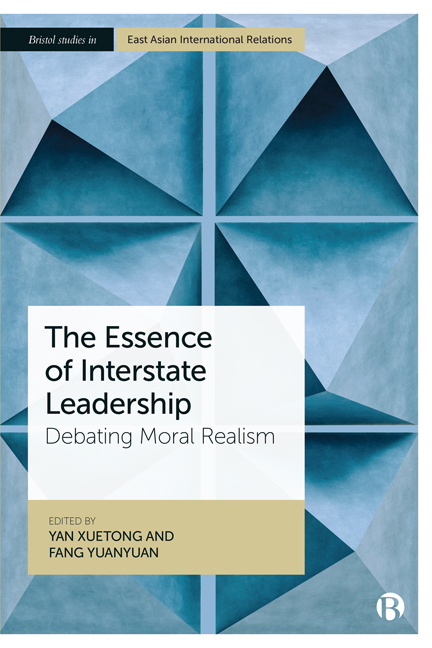Book contents
- Frontmatter
- Contents
- List of Abbreviations
- Notes on Contributors
- Preface
- 1 Interstate Leadership, Moral Realism, and their Critics
- 2 IR Moral Realism as a Universal Theory
- 3 Moral Realism as an Alternative Approach to the Agent-Structure Problem
- 4 Prospects, Promise, and Limitations of Moral Realism
- 5 Ideal Morality and Realist Interest of Moral Realism
- 6 The Conception of Morality in Moral Realism
- 7 Moral Realism and Hegemonic Transition
- 8 Innovation of Moral Realism and Dialogue with It
- 9 Moral Realism and Sino-American Relations
- 10 Moral Realism on Interstate Leadership in Response to Critics
- Appendix 1 Written Discussion between Rajesh Rajagopalan and Yan Xuetong
- Appendix 2 ‘Chinese School’ as an Inappropriate Title
- Selected Bibliography
- Index
10 - Moral Realism on Interstate Leadership in Response to Critics
Published online by Cambridge University Press: 18 January 2024
- Frontmatter
- Contents
- List of Abbreviations
- Notes on Contributors
- Preface
- 1 Interstate Leadership, Moral Realism, and their Critics
- 2 IR Moral Realism as a Universal Theory
- 3 Moral Realism as an Alternative Approach to the Agent-Structure Problem
- 4 Prospects, Promise, and Limitations of Moral Realism
- 5 Ideal Morality and Realist Interest of Moral Realism
- 6 The Conception of Morality in Moral Realism
- 7 Moral Realism and Hegemonic Transition
- 8 Innovation of Moral Realism and Dialogue with It
- 9 Moral Realism and Sino-American Relations
- 10 Moral Realism on Interstate Leadership in Response to Critics
- Appendix 1 Written Discussion between Rajesh Rajagopalan and Yan Xuetong
- Appendix 2 ‘Chinese School’ as an Inappropriate Title
- Selected Bibliography
- Index
Summary
Donald Trump's inauguration as 45th president of the US in January 2017 made the ‘leadership matters’ concept a main topic for discussion among international relations (IR) scholars. Although none could fail to acknowledge what dramatic changes the new American leadership had wrought on interstate politics, few carried out theoretical research on the unique nature of interstate leadership according to this phenomenon. As an IR theory, moral realism ascribes major changes in interstate politics to the changers in leadership types of major powers. To improve moral realism theory, this project invited seven excellent chapters on the topic. The questions and criticisms raised by the articles published in this book brought home to me the extent to which indistinct differentiations between interstate and domestic leadership hinder theoretical understanding of the interstate leadership concept. In answering the questions that the seven chapters ask, this chapter will discuss the singularity of interstate leadership, sequenced under the headings of unique nature, relative morality, quality measurement, functional conditions, and further studies.
The nature of interstate leadership
Although interstate and domestic leadership share many features, a general understanding of what actually constitutes leadership might strengthen IR theorists’ grasp of its unique nature. Since the anarchic international system throws into sharp relief the differences between interstate and domestic leadership, the latter of which operates as a hierarchy, analysis from an anarchical perspective is most apposite.Interstate leadership at the individual level of analysisWhether interstate or domestic, the voluminous IR literature on leadership popularly defines it as a process of interaction between leaders and followers in a given situation. Richard Hughes, Robert Ginnett, and Cordon Curphy say, ‘Leadership is more than just the kind of person the leader is or the things the leader does. Leadership is the process of influencing others toward the achievement of group goals; it is not just a person or a position’. Among the three key elements of leadership – leaders, followers, and situations – it is situations that distinguish the different natures of interstate and domestic leadership.
- Type
- Chapter
- Information
- The Essence of Interstate LeadershipDebating Moral Realism, pp. 179 - 203Publisher: Bristol University PressPrint publication year: 2023

